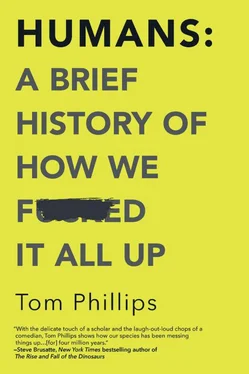Tom Phillips - Humans - A Brief History of How We F*cked It All Up
Здесь есть возможность читать онлайн «Tom Phillips - Humans - A Brief History of How We F*cked It All Up» весь текст электронной книги совершенно бесплатно (целиком полную версию без сокращений). В некоторых случаях можно слушать аудио, скачать через торрент в формате fb2 и присутствует краткое содержание. Город: Toronto, Год выпуска: 2019, ISBN: 2019, Издательство: Hanover Square Press, Жанр: История, Юмористические книги, на английском языке. Описание произведения, (предисловие) а так же отзывы посетителей доступны на портале библиотеки ЛибКат.
- Название:Humans: A Brief History of How We F*cked It All Up
- Автор:
- Издательство:Hanover Square Press
- Жанр:
- Год:2019
- Город:Toronto
- ISBN:978-1-48805-113-5
- Рейтинг книги:4 / 5. Голосов: 1
-
Избранное:Добавить в избранное
- Отзывы:
-
Ваша оценка:
- 80
- 1
- 2
- 3
- 4
- 5
Humans: A Brief History of How We F*cked It All Up: краткое содержание, описание и аннотация
Предлагаем к чтению аннотацию, описание, краткое содержание или предисловие (зависит от того, что написал сам автор книги «Humans: A Brief History of How We F*cked It All Up»). Если вы не нашли необходимую информацию о книге — напишите в комментариях, мы постараемся отыскать её.
Humans: A Brief History of How We F*cked It All Up — читать онлайн бесплатно полную книгу (весь текст) целиком
Ниже представлен текст книги, разбитый по страницам. Система сохранения места последней прочитанной страницы, позволяет с удобством читать онлайн бесплатно книгу «Humans: A Brief History of How We F*cked It All Up», без необходимости каждый раз заново искать на чём Вы остановились. Поставьте закладку, и сможете в любой момент перейти на страницу, на которой закончили чтение.
Интервал:
Закладка:
Think of it this way: the first step is noticing that round things roll down hills better than jagged lumpy things. The second is working out that if you use a tool to chip away at something and make it more round, it’ll roll better. The third step is showing your friend your new round rolling things, whereupon they come up with the idea of putting four of them together to make a wagon. The fourth step is building a fleet of ceremonial chariots, so that the people may better understand the glory of your benevolent yet merciless rule. And the fifth step is being stuck in a traffic jam on the New Jersey Turnpike listening to talk radio while flipping off some asshole who’s put Truck Nutz on the back of his SUV.
(IMPORTANT NOTE IN THE INTERESTS OF PEDANTRY: this is a wildly inaccurate cartoon description of the invention of the wheel. Wheels actually get invented surprisingly late in the scheme of things, well after civilization has been cheerfully muddling along without them for thousands of years. The first wheel in archaeological history, which pops up about 5,500 years ago in Mesopotamia, wasn’t even used for transport: it was a potter’s wheel. It seems to have been several hundred more years before somebody had the bright idea of turning potters’ wheels on their side and using them to roll stuff around, thus beginning the process that would ultimately lead to assholes who put Truck Nutz on their SUVs. Apologies to any wheel scholars who were offended by the previous paragraph, which was intended for illustrative purposes only.)
But while the human brain is remarkable, it is also extremely weird, and prone to going badly wrong at the worst possible moment. We routinely make terrible decisions, believe ridiculous things, ignore evidence that’s right in front of our eyes and come up with plans that make absolutely no sense. Our minds are capable of imagining concertos and cities and the theory of relativity into existence, and yet apparently incapable of deciding which type of potato chips we want to buy at the shop without five minutes’ painful deliberation.
How has our unique way of thinking allowed us to shape the world to our desires in incredible ways, but also to consistently make absolutely the worst possible choices despite it being very clear what bad ideas they are? In short: How can we put a man on the moon and yet still send THAT text to our ex? It all boils down to the ways that our brains evolved.
The thing is that evolution, as a process, is not smart—but it is at least dumb in a very persistent way. All that matters to evolution is that you survive the thousand possible horrible deaths that lurk at every turn for just long enough to ensure that your genes make it through to the next generation. If you manage that, job done. If not, tough luck. This means that evolution doesn’t really do foresight. If a trait gives you an advantage right now , it’ll be selected for the next generation, regardless of whether or not it’s going to end up lumbering your great-great-great-great-great-grandchildren with something that’s woefully outdated. Equally, it doesn’t give points for prescience—saying, “Oh, this trait is kind of a hindrance now, but it’ll come in really useful for my descendants in a million years’ time, trust me” cuts absolutely no ice. Evolution gets results not by planning ahead, but rather by simply hurling a ridiculously large number of hungry, horny organisms at a dangerous and unforgiving world and seeing who fails least.
This means that our brains aren’t the result of a meticulous design process aimed at creating the best possible thinking machines; instead, they’re a loose collection of hacks and bodges and shortcuts that made our distant ancestors 2 percent better at finding food, or 3 percent better at communicating the concept “Oh shit, watch out, it’s a lion.”
Those mental shortcuts (they’re called “heuristics,” if you want to get technical) are absolutely necessary for surviving, for interacting with others and for learning from experience: you can’t sit down and work out everything you need to do from first principles. If we had to conduct the cognitive equivalent of a large-scale randomized control trial every time we wanted to avoid being shocked by the sun rising in the morning, we’d never have got anywhere as a species. It’s a lot more sensible for your brain to go, “Oh yeah, sun rises” after you’ve seen it happen a few times. Likewise, if Jeff tells you that eating the purple berries from that bush by the lake made him violently ill, it’s probably best to just believe him, rather than try it out for yourself.
But this is also where the problems begin. As useful as they are, our mental shortcuts (like all shortcuts) will sometimes lead us down the wrong path. And in a world where the issues we have to deal with are a lot more complex than “Should I eat the purple berries?” they get it wrong a lot . To be blunt, much of the time your brain (and my brain, and basically everybody’s brain) is a massive idiot.
For a start, there’s that ability to spot patterns. The problem here is that our brains are so into spotting patterns that they start seeing them all over the place—even where they don’t exist. That’s not a huge problem when it just means stuff like pointing at the stars in the night sky and going, “Ooh, look, it’s a fox chasing a llama.” But once the imaginary pattern you’re seeing is something like “most crimes are committed by one particular ethnic group,” it’s… well, it’s a really big problem.
There are a bunch of terms for this kind of faulty pattern-spotting—things like “illusory correlation” and the “clustering illusion.” During World War II, many people in London became convinced that German V-1 and V-2 missiles (an already pretty terrifying new technology) were falling on the city in targeted clusters—leading Londoners to seek shelter in supposedly safer parts of the city, or suspect that certain seemingly untouched neighborhoods housed German spies. This was concerning enough that the British government got a statistician named R. D. Clarke to check whether it was true.
His conclusion? The “clusters” were no more than our minds playing tricks on us, the illusory ghosts of pattern-matching. The Germans hadn’t made a dramatic breakthrough in guided missile technology, after all, and Clerkenwell was not a hotbed of Wehrmacht secret agents; the doodlebugs were just being lobbed in the general direction of the city entirely at random. People only saw patterns because that’s what our brains do.
Even skilled professionals can fall victim to these types of illusions. For example, plenty of medical workers will tell you with certainty that a full moon invariably leads to a bad night in the ER ward—a surge of patients, bizarre injuries and psychotic behavior. The only trouble is that studies have looked at this, and as far as they can tell, it’s just not true: there’s no link between the phases of the moon and how busy emergency rooms get. And yet a bunch of talented, experienced professionals will swear blind that there is a connection.
Why? Well, the belief doesn’t come from nowhere. The idea that the moon makes people go weird is one that’s been around for centuries. It’s literally where the word lunacy comes from; it’s why we have werewolf mythology. (It may also be related to the supposed correlation between the phases of the moon and women’s menstrual cycles.) And the thing is, it actually might have been sort of true at one time! Before the invention of artificial lighting—street lighting especially—the light of the moon had a much greater effect on people’s lives. One theory suggests that homeless people sleeping outdoors would have been kept awake by the full moon, with sleeplessness exacerbating any mental health problems they had. (Because I like theories that involve beer, I’d also float an alternative suggestion: people probably got way more drunk on evenings when they knew they could see their way home and so were less worried about getting lost, or robbed, or tripping over and dying in a ditch.)
Читать дальшеИнтервал:
Закладка:
Похожие книги на «Humans: A Brief History of How We F*cked It All Up»
Представляем Вашему вниманию похожие книги на «Humans: A Brief History of How We F*cked It All Up» списком для выбора. Мы отобрали схожую по названию и смыслу литературу в надежде предоставить читателям больше вариантов отыскать новые, интересные, ещё непрочитанные произведения.
Обсуждение, отзывы о книге «Humans: A Brief History of How We F*cked It All Up» и просто собственные мнения читателей. Оставьте ваши комментарии, напишите, что Вы думаете о произведении, его смысле или главных героях. Укажите что конкретно понравилось, а что нет, и почему Вы так считаете.












